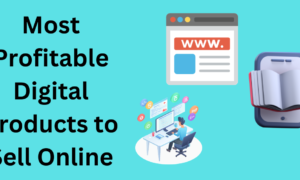Welcome to the world of online selling, where opportunities are endless and success is just a few clicks away! In today’s digital age, having an online presence for your business has become more crucial than ever. Whether you’re a small startup or an established brand, selling online can unlock new markets and skyrocket your sales. But how do you navigate this vast virtual marketplace? Fear not! In this blog post, we’ll guide you through the steps on how to sell online quickly and successfully. So fasten your seatbelts and get ready to embark on an exciting e-commerce journey that will take your business to new heights!
The Importance of Selling Online
In today’s digitally-driven world, selling online has become an essential strategy for businesses of all sizes. The importance of establishing an online presence cannot be overstated.
First and foremost, selling online allows you to reach a much larger audience compared to brick-and-mortar stores. With the internet connecting people from around the globe, your potential customer base becomes virtually limitless. By tapping into this vast market, you can expand your business beyond geographical boundaries and unlock new growth opportunities.
Furthermore, selling online provides convenience both for you as a seller and for your customers. Gone are the days when shoppers had to physically visit stores during limited operating hours. Online shopping allows consumers to browse products at any time that suits them best – whether it’s early in the morning or late at night. This accessibility leads to increased customer satisfaction and ultimately boosts sales.
Another advantage of selling online is cost-effectiveness. Setting up an e-commerce store typically requires lower initial investment compared to opening a physical storefront with rent, utilities, and inventory costs. Additionally, digital marketing tools allow you to target specific customer segments with precision while minimizing advertising expenses.
Lastly but certainly not least important is the ability to gather valuable data about consumer behaviors through various analytics tools provided by e-commerce platforms. This data proves invaluable when it comes to understanding your customers’ preferences and tailoring your offerings accordingly.
In conclusion… Oops! Sorry about that slip! Stay tuned as we move forward in our journey towards mastering the art of successful online selling!
Choosing the Right Platform for Your Business
When it comes to selling online, choosing the right platform for your business is crucial. With so many options available, it can be overwhelming to determine which platform will best suit your needs. However, taking the time to research and select the right platform can significantly impact your success in the e-commerce world.
First and foremost, consider what features are essential for your store. Do you need a user-friendly interface? Built-in marketing tools? Integration with other software or apps? Make a list of must-haves before diving into the sea of platforms.
Next, think about scalability. As your business grows, will the chosen platform be able to accommodate increased traffic and sales? It’s important to choose a platform that can grow with you without causing technical headaches down the line.
Another factor to consider is cost. While some platforms offer free plans or low monthly fees, others may charge additional transaction fees or require costly add-ons for certain features. Be sure to factor in both upfront costs and long-term expenses when making your decision.
Additionally, take into account customer support options offered by different platforms. Will there be someone readily available to assist if any issues arise? Prompt and reliable customer support can save you valuable time and frustration in troubleshooting problems that might occur.
Seek out reviews from other business owners who have used various platforms. Their firsthand experiences can provide valuable insights into each option’s pros and cons.
Remember: choosing the right platform lays the foundation for your online store’s success! So take your time exploring different options before making a final decision on where to set up shop online
Tips for Creating a Successful Online Store:
Identifying your target market is a crucial step in creating a successful online store. Understanding who your potential customers are and what they want allows you to tailor your products, marketing strategies, and website design to better resonate with them. Conduct thorough market research, analyze consumer behavior patterns, and gather feedback from existing customers to gain valuable insights.
Next, focus on creating a compelling brand and website that captivates your target audience. Your brand identity should reflect the values and personality of your business while effectively communicating its unique selling proposition. Invest in professional web design that is visually appealing, user-friendly, and optimized for mobile devices.
Utilizing social media platforms such as Facebook, Instagram, Twitter, or LinkedIn can significantly boost your online presence. Develop a strategic digital marketing plan that includes regular content creation, engaging with followers through comments and direct messages, collaborating with influencers or bloggers in your niche industry.
Furthermore…
– Identifying your target market
Identifying your target market is a crucial step in selling online quickly and successfully. It involves understanding who your ideal customers are, what they need, and how you can meet those needs. By narrowing down your focus to a specific group of people, you can tailor your marketing efforts and offerings to resonate with them.
To begin identifying your target market, start by conducting thorough research. Look into demographics such as age, gender, location, income level, and interests that align with your product or service. This information will help you create buyer personas – fictional representations of your ideal customers.
Once you have an idea of who your target market is, dig deeper to understand their pain points and motivations. What problems do they face that your product or service can solve? What drives their purchasing decisions? By answering these questions, you can position yourself as the solution provider they’ve been looking for.
In addition to demographic data and customer insights, analyzing competitor strategies can also provide valuable insights into targeting opportunities within the market. Consider studying successful businesses in similar industries or niches to see how they attract their customers.
Remember that identifying a target market does not mean excluding potential customers outside that group; it simply means focusing on a specific segment where you believe there is the most opportunity for success. By honing in on this audience and understanding their needs deeply, you’ll be better equipped to craft effective marketing messages and experiences that resonate with them.
So take the time to identify who exactly would benefit from what you offer – get inside their heads! Understanding this will set the foundation for all other aspects of selling online successfully.
– Creating a compelling brand and website
Creating a compelling brand and website is crucial when it comes to selling online. Your brand identity is what sets you apart from your competitors and helps build trust with your customers. It’s important to carefully consider the design, colors, fonts, and imagery that will represent your brand effectively.
When creating your website, focus on simplicity and user-friendliness. Make sure it loads quickly, has clear navigation menus, and showcases your products or services prominently. Keep in mind that mobile optimization is essential as more people are using their smartphones for online shopping.
In addition to aesthetics, make sure your website provides valuable content for visitors. This can include product descriptions, blog posts related to your industry or niche, customer testimonials or reviews – anything that adds value and builds credibility.
To further enhance your brand image, use consistent branding across all platforms – social media profiles should reflect the same look and feel as your website. Engage with followers by posting relevant content regularly and responding promptly to comments or messages.
Remember that building a strong brand takes time but pays off in the long run. By creating a visually appealing website coupled with engaging content and consistent branding efforts, you’ll be well on your way to attracting customers who resonate with what you have to offer.
– Utilizing social media and digital marketing
Utilizing social media and digital marketing is crucial for the success of your online store. In today’s digital age, platforms like Facebook, Instagram, Twitter, and Pinterest provide excellent opportunities to reach a wider audience and drive traffic to your website.
One effective strategy is to create engaging content that resonates with your target market. This could include informative blog posts, captivating images or videos related to your products or services. By sharing this content on social media channels, you can attract potential customers who are interested in what you have to offer.
Another powerful tool is influencer marketing. Collaborating with influencers in your niche can help increase brand awareness and credibility. When influencers promote your products or give positive reviews, their followers are more likely to trust and buy from you.
Paid advertising on social media platforms also plays a vital role in driving traffic and sales. Platforms like Facebook Ads allow you to target specific demographics based on location, interests, behavior patterns, and more.
In addition to social media marketing, optimizing your website for search engines through SEO (Search Engine Optimization) techniques is essential for visibility online. Conducting keyword research and incorporating those keywords into high-quality content will improve organic rankings on search engine result pages.
Email marketing campaigns can also be highly valuable in nurturing leads and converting them into customers. Building an email list allows you to send targeted offers or personalized recommendations directly to interested individuals’ inbox.
Remember that consistency is key when utilizing social media and digital marketing strategies – regularly posting quality content helps build brand loyalty while keeping customers engaged with updates about new products or promotions.
By harnessing the power of social media platforms along with other digital marketing techniques such as SEO optimization and email campaigns – You’ll be well-equipped for success in selling online quickly!
Understanding E-commerce Laws and Regulations
In the world of online selling, it’s crucial to have a solid understanding of e-commerce laws and regulations. These rules vary from country to country, so it’s essential to familiarize yourself with the specific legislation in your target market.
One key aspect is data protection and privacy laws. As an online seller, you’ll be collecting personal information from customers such as names, addresses, and payment details. It’s important to comply with regulations regarding how this data is stored, used, and protected.
Another area to consider is consumer rights and protection laws. This ensures that your customers are provided with accurate product descriptions, clear pricing information, and fair terms of service. Understanding these laws will help you avoid legal issues or disputes with customers.
Additionally, intellectual property laws play a significant role in e-commerce. Trademarks and copyrights protect brands’ logos or creative works like photos or written content. Researching these laws will help you avoid infringing on someone else’s intellectual property rights.
Taxation regulations are vital for any online business owner. Different jurisdictions have different rules regarding sales tax or value-added tax (VAT). Familiarize yourself with the requirements in each region where you sell products to ensure compliance.
By understanding e-commerce laws and regulations applicable to your business operations, you can mitigate legal risks while building trust with your customers.
Fulfillment and Shipping: How to Ensure Smooth Transactions
Fulfillment and shipping are crucial aspects of running a successful online store. Ensuring smooth transactions not only keeps your customers happy but also builds trust in your brand. Here are some tips to help you streamline this process.
It’s essential to choose reliable shipping partners that offer competitive rates and timely delivery. Research different carriers and compare their services to find the best fit for your business.
Next, consider implementing automation tools or software that can help you manage orders efficiently. This will save you time and reduce errors in the fulfillment process.
Invest in quality packaging materials to protect your products during transit. A damaged item not only leads to customer dissatisfaction but also increases return rates, affecting your bottom line.
Track all shipments and provide customers with tracking numbers so they can monitor their orders’ progress. This transparency enhances their overall shopping experience.
Communicate clearly with customers regarding shipping times, potential delays, and any additional fees such as customs charges for international orders. Being upfront about these details avoids misunderstandings later on.
By prioritizing fulfillment and shipping processes, you’ll ensure smooth transactions for your online store while providing a positive experience for your customers.
Dealing with Customer Service and Returns
Customer service is a crucial aspect of any successful online selling business. In the digital world, where customers cannot physically interact with products before purchasing, providing excellent customer service becomes even more important.
When it comes to dealing with customer inquiries or issues, prompt and helpful responses are key. Make sure you have clear channels of communication available to your customers, such as email or live chat support. Responding quickly shows that you value their time and concerns.
Returns are inevitable in any retail setting, including online stores. Having a well-defined return policy can help streamline the process for both you and your customers. Clearly state your policy on your website so that customers know what to expect if they need to return an item.
In addition to having a clear policy, it’s essential to handle returns efficiently and professionally. Provide detailed instructions on how customers should initiate returns and make sure they receive timely updates throughout the process.
Remember that each interaction is an opportunity to leave a lasting impression on your customers. Even if they encounter an issue or need to return a product, going above and beyond in resolving their concerns can turn them into loyal advocates for your brand.
By prioritizing top-notch customer service and handling returns smoothly, you build trust with your audience while establishing credibility for your online store.
Conclusion: The Potential of Online Selling and Final Tips
As we have explored in this article, selling online can be a game-changer for your business. The potential to reach a global audience, increase sales, and expand your brand presence is immense. However, it’s essential to approach online selling with careful planning and strategy.
To summarize our discussion so far:
1. Choose the right platform: Select an e-commerce platform that aligns with your business goals and offers the features you need to succeed.
2. Identify your target market: Understanding who your customers are will help you tailor your marketing efforts and product offerings accordingly.
3. Create a compelling brand and website: Your online store should reflect the essence of your brand through visually appealing design, clear messaging, and easy navigation.
4. Utilize social media and digital marketing: Leverage the power of social media platforms like Facebook, Instagram, or Twitter to reach potential customers effectively.
5. Understand e-commerce laws and regulations: Familiarize yourself with legal requirements related to data privacy, consumer protection rights, shipping restrictions, etc., ensuring compliance at all times.
6. Ensure smooth fulfillment and shipping processes: Provide accurate information about delivery timescales upfront while partnering with reliable shipping providers or considering options like dropshipping or third-party logistics (3PL).
7. Deal promptly with customer service issues & returns- Always prioritize excellent customer service by responding promptly to inquiries or complaints from customers; handle returns smoothly without compromising on customer satisfaction.
Finally here are some additional tips for successful online selling:
– Optimize product descriptions using relevant keywords for better search engine visibility.
– Offer multiple payment options to cater to diverse customer preferences.
– Regularly update inventory levels on your website.
– Implement user-friendly checkout processes that minimize cart abandonment rates
– Stay informed about emerging trends in e-commerce industry
By implementing these strategies effectively while staying adaptable in this ever-evolving digital landscape, you can unlock the full potential of online selling.



























